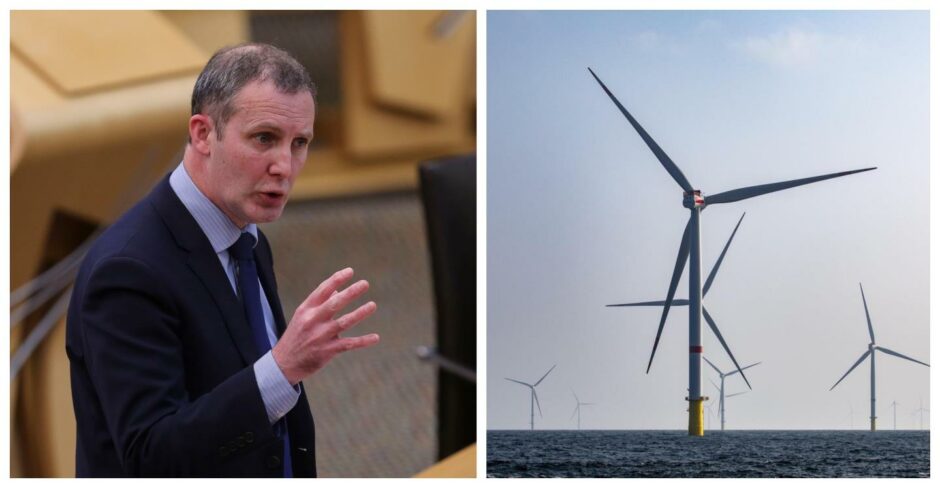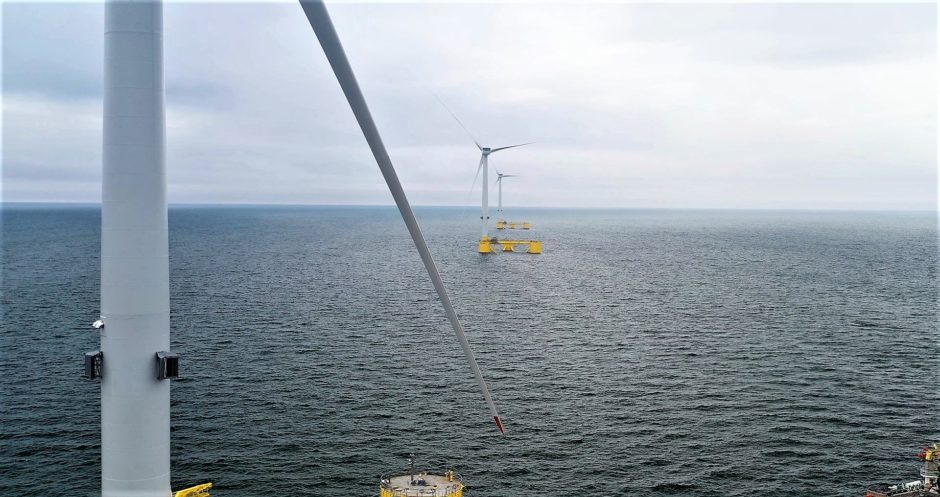
Aberdeen business leaders have condemned the Scottish Government’s new energy plan as a “breathtaking betrayal of one of Scotland’s biggest industries.”
Chief executive of Aberdeen & Grampian Chamber of Commerce, Russel Borthwick, says the “presumption against” new North Sea oil and gas exploration has been met with complete disbelief” in the region.
He called on the Scottish Government to “reverse this damaging, job-destroying position before it is too late”.
Similar criticisms have come in from former oil tycoon and philanthropist Sir Ian Wood, and industry trade groups.
Cabinet secretary for net zero, energy and transport, Michael Matheson, presented the Scottish government’s latest energy plan in Holyrood today.
Its overarching aim is to set a course for Scotland’s energy transition, setting out how government intends to ensure a just transition from oil and gas to renewbales.
Addressing the Scottish Parliament on Tuesday, Mr Matheson said: “The oil and gas industry has played an important role in our economy and has been a part of our national identity for decades, however, our previous policy position of maximum economic recovery is no longer appropriate.
“This strategy explores the challenges of moving away from oil and gas and the ability of low carbon and net zero energy generation to, not just replace, but to build on the employment opportunities that people, particularly in the north-east have come to rely on.”
‘Presumption against’ new exploration
Specifically, the plan underlines the “prosperity” the oil and gas sector has brought to the north-east, hailing the region as a “global centre for the energy industry”.
Nevertheless, ministers stress that “unlimited extraction of fossil fuels is not consistent” with efforts to decarbonise, reinforcing that ‘maximum economic recovery’ is no longer government policy.
Along that vein, the document declares “there should be a presumption against new exploration for oil and gas” in the North Sea.
It also takes aim at the UK Government’s climate compatibility checkpoint – a new feature that applies to the ongoing licensing round – describing the criteria as “not rigorous enough” and calling for them to be strengthened.
As it stands, Holyrood’s opposition to North Sea exploration is largely ceremonial, given powers over UK energy policy still reside in Westminster.
Aberdeen businessman Sir Ian Wood said the “reality” is the jobs and economic benefits of renewables “will not be available at scale until 2030 at the very earliest” and said Scotland must continue oil and gas production as part of energy security.
“The Scottish Government’s presumption against further oil and gas exploration is unhelpful and risks creating an adverse environment for investment in the industry at a time we need to be doing all we can to achieve greater energy security and sustain high-skilled employment.
“We will therefore be making strong representations to the Scottish Government as part of the consultation encouraging them to rethink this position.”
‘Little economic sense, less environmental sense’
But Mr Borthwick of the AGCC has flagged the potentially damaging impact of not backing North Sea exploration on local businesses, as well as the UK’s energy security.
He said: “This move towards a presumption against exploration for North Sea oil and gas has been met with compete disbelief in the North-east of Scotland.
“While the Scottish Government’s position is largely symbolic, as these matters are reserved to the Westminster parliament, this is still a breathtaking betrayal of one of Scotland’s biggest industries.
“We welcome the strategy’s backing for the Acorn Project and its ambition to increase investment in lower carbon technologies, including hydrogen. However, the energy transition is going to take 25 years or more and there is quite clearly a sustained period of time where oil and gas will remain a crucial part of our energy mix.
“So, we have two options; to produce more domestically, with full control over the regulatory environment in which it is extracted; or to import an increasing amount of our energy, with the heavier carbon toll that shipping it from other parts of the world carries. The latter makes little economic sense, and even less environmental sense.
Unsure on pros of domestic production
Despite formally declaring its opposition to new exploration, the plan does concede that it is “difficult to establish the net impact on global emissions of new UK oil and gas production” as North Sea supplies have a “relatively low carbon footprint”, compared to other regions.
On the energy price front, the plan says “unlimited extraction” is “not the right solution” to rising bills, or to securing domestic energy security.
Mr Borthwick added: “The position set-out today suggests a fundamental misunderstanding of the energy transition, and the requirement for oil and gas to fuel it. Drilling and production are still very much needed in the short, medium, and long term to bridge, and in many cases, fund, the transition.
“Furthermore, it suggests that ministers have learned nothing from the energy crisis of 2022 – a crisis which has been exacerbated by our reliance on energy imports due, in part, to a lack of new North Sea exploration and production over the last decade.”
Mr Borthwick and Sir Ian highlighted that premature shut-down of the sector would lead to greater imports.
Sir Ian said: “It is absolutely clear that it makes no sense to prematurely reduce our domestic oil and gas production only to increase carbon heavy imports from overseas.
“This would be entirely counterproductive, both environmentally and economically, resulting in a significant loss of revenues from oil and gas and from its large supply chain whilst putting at risk a large number of jobs in the UK and certainly in the North East of Scotland.”
Jenny Stanning, external relations director at Offshore Energies UK, said: “We are concerned at the statement’s suggestion of accelerating the decline in oil and gas production.
“Scotland gets 79% of its total energy from oil and gas according to its latest official figures. Across the UK about 24 million homes (85% of the total) rely on gas boilers for heat and we get 42% of our electricity from gas. We also have 32 million vehicles running on petrol and diesel.
“These plain facts means we will need gas and oil for decades to come. Additionally, in Scotland alone, the offshore industry supports 90,000 jobs. Across the UK it’s around 200,000.”
Backing for wind
Looking towards green energy, Mr Matheson hailed wind energy as “one of the lowest cost forms of electricity”.
He added that the Scottish government is “clear” that the renewable energy source is where it should focus.
“As an increasingly mature basin production in the North Sea is expected to be at one-third of 1999 levels by 2035 and less than 3% of the 1999 peak by 2050,” he said.
“Domestic production will effectively end in 20 years if we do nothing.”
SSE Chief Executive, Alistair Phillips-Davies said: “We welcome the publication of the Scottish Government’s draft Energy Strategy and Just Transition Plan.
“Scotland has some of the world’s best clean energy resources and a real opportunity to deliver a transition that meets legally binding climate commitments and delivers for workers and communities across the country.
“The draft strategy supports ambitious plans for developing onshore and offshore wind, pumped hydro storage, carbon capture and hydrogen.
“But to get there requires increased pace and we look forward to working with the Scottish Government and its agencies to turn the ambitions contained within the Strategy and Plan into tangible actions that support the clean energy transition, build local supply chains, create good green jobs and work in partnership with communities.
“As Scotland’s largest electricity infrastructure company, and the first in the world to publish a ‘Just Transition Strategy’, we stand ready to play our part with a potential £15bn investment programme for Scotland by the end of this decade that will accelerate progress towards net zero and support thousands of good jobs across the country.”
Tessa Khan, executive director of Uplift added: “It’s welcome to see the Scottish government explicitly connecting the cost of living and climate crises we’re facing with our current over-reliance on fossil fuels.
“Crucially, this draft strategy recognises that we need the fastest and fairest transition possible away from oil and gas. But for Nicola Sturgeon to claim the title of climate leader, she needs to champion an end date for oil and gas production, which is what the climate demands.”
North-east Tory MSP Liam Kerr said the strategy will “represent a far from happy new year” for the tens of thousands of oil and gas workers.
He added: “These workers often feel like an afterthought for this government and that impression won’t improve after today.”
Colin Smyth, Scottish Labour’s energy spokesman, hit out at Scottish ministers for failing to meet green job targets. He said: “In 2010 the SNP promised there would be 130,000 green jobs per year by 2020, claiming we would be the Saudi Arabia of renewables – but instead just a fifth of those jobs have been delivered and supply chain contract after contract continues to go overseas.”
Recommended for you

 © Supplied by Kami Thomson / DC Th
© Supplied by Kami Thomson / DC Th © Supplied by Kami Thomson / DC Th
© Supplied by Kami Thomson / DC Th
 © Supplied by OGUK
© Supplied by OGUK © Supplied by PA/ Ineos
© Supplied by PA/ Ineos © Boskalis
© Boskalis